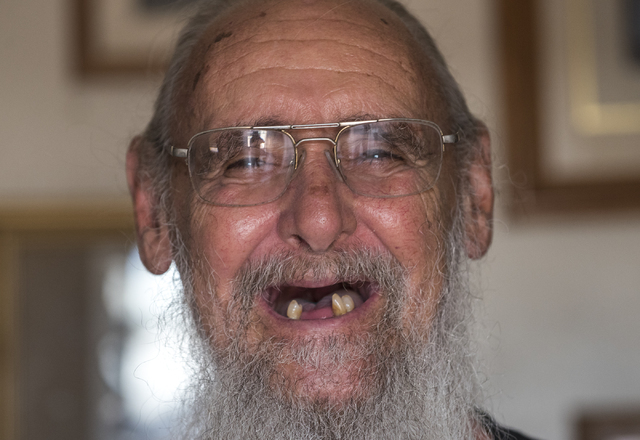Veteran’s problems don’t stop him from reaching out

Wounded.
Joseph Konicek’s discharge papers from the U.S. Marine Corps don’t say that.
But the 66-year-old former radioman definitely was wounded during the Vietnam War.
He finally found out last year, 43 years after his military service ended — the first time he visited doctors in all that time.
We sit in his apartment near the intersection of Maryland Parkway and Sahara Avenue, and he shows me the 70 percent disability award he received last year from Veterans Affairs for post-traumatic stress disorder.
“I went to the doctor because I met this guy at a casino and told him what kept going on in my mind, and he said I should go to the VA,” Konicek, a recently retired flooring installer, said Saturday as he stroked his long, gray beard. “A psychiatrist said I had problems.”
It turns out, he said, that his mind too often has taken him back to the war, where he heard a fellow Marine who had been hit screaming for his mama over and over again, where Marines on both sides of him fell from rifle fire as they ran across a rice paddy.
“Sometimes I hear that ‘mama, mama, mama’ so much in my head it drives me crazy,” Konicek said. “And I keep waking up a lot sweating from that time in the rice paddy. I handled this for years by myself, but it’s been hard.”
Some wounds take longer to heal than others.
At this time, on this day, this man who has been tortured by war for most of his adult life — a psychologist has helped him get over flashbacks faster — didn’t want to talk about combat scenes that won’t go away.
He said he really got in touch with me to let me know September is Prostate Cancer Awareness Month — that he wanted to keep men from being tortured by the disease, which he learned he had during visits to the VA last year.
Just because somebody has problems, he said, doesn’t mean an individual shouldn’t try to keep others from hurting.
“Isn’t that being a human being?” Konicek asked.
He noted a simple blood screening known as the prostate-specific antigen (PSA) test — generally given annually after the after the age of 50 — can find prostate cancer early, when it’s highly treatable.
“I wish I’d been tested earlier,” he said.
Still, it appears his advanced prostate cancer — the VA referred him to 21st Century Oncology of Las Vegas — has been beaten by nine weeks of daily radiation directed by Dr. Tam Nguyen.
Konicek plans on being at the This One’s for the Boys and Girls 5K charity event — prostate and ovarian cancer awareness months are both in September — at UNLV’s Myron Partridge Track Stadium at 9.a.m. Sept. 10.
On Sunday, Konicek, who doesn’t drink or use drugs, shared more about his military experiences and its effects.
After joining the Marines in 1968, he served two tours in Vietnam. Though often in firefights or on bases rocketed and mortared, two incidents hammered his psyche.
One occurred after he radioed for a helicopter for a badly wounded Marine.
“He kept yelling for his mama until just before the chopper came,” he said. “I don’t know whether he died or the medic gave him morphine. I can’t get rid of that cry. It hits me sometimes when I hear about a mother or even see a mother.”
On another occasion, he and other Marines were ambushed in a rice paddy. He’s alive because the pack on his back somehow blocked three bullets. “Wish I’d forget it,” he said.
For some reason, he said, those experiences made him want to stay away from people, including doctors.
He said he was outgoing at his Chicago high school.
“Now I like riding my motorcycle by myself,” the longtime bachelor said. “I only feel good then.”
He also preferred working by himself. Helpers irritated him.
When he had dental problems, he didn’t feel like talking to a dentist.
“I pulled all but three teeth with pliers and got it over with,” he said. “That kind of pain doesn’t bother me.”
Paul Harasim’s column runs Sunday, Tuesday and Friday in the Nevada section and Thursday in the Life section. Contact him at pharasim@reviewjournal.com or 702-387-5273. Follow @paulharasim on Twitter.